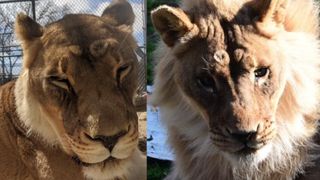Elderly female lion grows 'awkward teenage mane,' baffling zookeepers
An elderly female lion at the Topeka Zoo in Kansas has sprouted a mane. This phenomenon has only been seen a handful of times.

A female lion at the Topeka Zoo in Kansas has grown a mane, an extremely rare phenomenon.
Zuri, an 18-year-old lioness, started sprouting the mane in late 2020. She is part of an all-female pride at the zoo, the last male having passed away in October 2020. But lion experts say the mane growth likely has little to do with Zuri trying to step into a male pride leader's pawprints.
"I don’t think there's really any kind of evolutionary [reason for this], either lack of males or too much competition with other females or anything like that," Kris Everatt, a conservation scientist for the global wild cat conservation organization Panthera, told Live Science. "I think it’s just a random event."
It's not unheard-of for female lions to sprout manes, though it is very unusual. The phenomenon has occurred a few times at zoos around the world, including a 2011 case in South Africa and a 2018 case at the Oklahoma City Zoo. Females in the wild have also been known to grow manes, with five cases reported from Botswana in a 2016 paper in the Journal of African Ecology.
Related: In photos: The lions of Kenya's Masai Mara
In the case of the wild lions, there was no hormonal or DNA data to explain the mane growth, Craig Packer, a biologist and founder of the Lion Center at the University of Minnesota, told Live Science in an email. By comparison, the Oklahoma City Zoo's maned female showed an overproduction of androstenedione, a hormone the body uses to produce the masculinizing hormone testosterone.
Topeka Zoo vets have not ordered specific hormone tests for Zuri, the zoo's animal curator Shanna Simpson told Live Science. The lioness has passed all of her standard health screenings, and hormone tests aren't a typical part of the check-up, Simpson said.
Sign up for the Live Science daily newsletter now
Get the world’s most fascinating discoveries delivered straight to your inbox.
"We've done a full work-up on Zuri and we don't have any reason to believe she has any kind of cancer" or other serious conditions, Simpson said. Unless the lioness starts to show signs of illness, the zoo plans to keep tabs on her without any invasive testing.
Zuri began sprouting a mohawk-like tuft of fur not long after the zoo's male died, Simpson said. Her mane has since filled in, but isn't as full as an adult male lion's.
"She just basically looks like an awkward teenage male lion," Simpson said.
—Did cats really disappear from North America for 7 million years?
—Poachers tried to kill rhinos in South African reserve. Instead, a pride of lions killed them.
Zuri seems more feisty since sprouting her furry new neck accessory, Simpson added, and has been growling, snarling, and roaring more often.
At eighteen years old, Zuri has well exceeded the lifespan of a lion in the wild, prompting Everatt to speculate that perhaps the lioness might be experiencing hormonal shifts due to extreme age. In zoos, lions' median life expectancy is 14.5 years, Simpson said, so Zuri is ancient even for a lion in captivity. As is typical of many older felines, Zuri is experiencing early-stage kidney disease, which is currently being held in check by diet and medication, Simpson said. Zuri also has some arthritis, for which she takes pain medications.
"We have no reason to believe she’s unhealthy in any way with what’s going on with this faux mane," Simpson said. "She’s just very weird-looking."

Stephanie Pappas is a contributing writer for Live Science, covering topics ranging from geoscience to archaeology to the human brain and behavior. She was previously a senior writer for Live Science but is now a freelancer based in Denver, Colorado, and regularly contributes to Scientific American and The Monitor, the monthly magazine of the American Psychological Association. Stephanie received a bachelor's degree in psychology from the University of South Carolina and a graduate certificate in science communication from the University of California, Santa Cruz.
Most Popular

